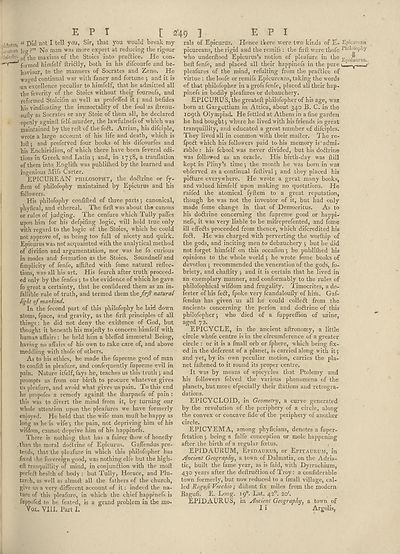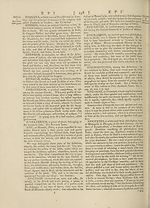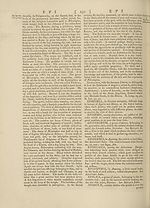Encyclopaedia Britannica, or, a Dictionary of arts, sciences, and miscellaneous literature : enlarged and improved. Illustrated with nearly six hundred engravings > Volume 8, ELE-FOR
(271) Page 249
Download files
Complete book:
Individual page:
Thumbnail gallery: Grid view | List view

E P I [ 2'49 ] E P I
.^etuS) « Did not I tell you, Sir, that you would break my
vlrurean lCg ?” No man was more expert at reducing the rigour
•ilofophy. 0f thg maxims of the Stoics into pra&ice. He con-
r"J formed himfelf ftrictly, both in his difcourfe and be¬
haviour, to the manners of Socrates and Zeno. He
waged continual war with fancy and fortune •, and it is
an excellence peculiar to himfelf, that he admitted all
the feverity of the Stoics without' their fournefs, and
reformed Stoicifm as well as jirofeffed it *, and betides
his vindicating the immortality of the foul as ftrenu-
outly as Socrates or any Stoic of them all, he declared
openly againtt felf-murder, the lawfulnefsof which was
maintained by the reft of the fe&. Arrian, his difciple,
wrote a large account of his life and death, which is
loft; and preferved four books of his difcourfes and
his Enchiridion, of which there have been feveral edi¬
tions in Greek and Latin ; and, in 1758, a tranflation
of them into Englifti was publithed by the learned and
ingenious Mifs Carter.
EPICUREAN philosophy, the doctrine or fy-
ftem of philofophy maintained by Epicurus and his
followers.
His philofophy confifted of three parts; canonical,
phyfical, and ethereal. The firft was about th® canons
or rules of judging. The cenfure which Tully paftes
upon him for his defpifmg logic, will hold true only
with regard to the logic of the Stoics, which he could
not approve of, as being too full of nicety and quirk.
Epicurus was not acquainted with the analytical method
of divifion and argumentation, nor was he fo curious
in modes and formation as the Stoics. Soundnefs and
fimplicity of fenfe, aflifted with fome natural reflec¬
tions, was all his art. His fearch after truth proceed¬
ed only by the fenfes ; to the evidence of which he gave
fo great a certainty, that he confidered them as an in¬
fallible rule of truth, and termed them the JirJ} natural
light of mankind.
In the fecond part of this philofophy he laid down
atoms, fpace, and gravity, as the firft principles of all
things: he did not deny the exiftence of God, but
thought it beneath his majefty to concern himfelf with
human affairs: he held him a bleffed immortal Being,
having no affairs of his own to take care of, and above
meddling writh thofe of others.
As to his ethics, he made the fupreme good of man
to confift in pleafure, and confequently fupreme evil in
pain. Nature itfelf, fays he, teaches us this truth ; and
prompts us from our birth to procure whatever gives
us pleafure, and avoid what gives us pain. To this end
he propofes a remedy againft the fliarpnefs of pain :
this was to divert the mind from it, by turning our
whole attention upon the plea lures we have formerly
enjoyed. He held that the wife man muft be happy as
long as he is wife*, the pain, not depriving him of his
wifdom, cannot deprive him of his happinefs.
There is nothing that has a fairer (how of honefty
than the moral doftrine of Epicurus. Gaffendus pre¬
tends, that the pleafure in which this philofopher has
fixed the fovereign good, was nothing elfe but the high-
eft tranquillity of mind, in conjumftion with the moft
perfeR health of body : but Tully, Horace, and Plu¬
tarch, as well as almoft all the fathers of the church,
give us a very different account of it: indeed the na¬
ture of this pleafure, in which the chief happinefs is
fuppofed to be feated, is a grand problem in the mo-
Vol. VIII. Part I.
rals of Epicurus. Hence there were two kinds of E- Epicurean
picureans, the rigid and the remifs: the firft were thofe Ehilofophy
who underftood Epicurus’s notion of pleafure in the j7pKjyurus
beft fenfe, and placed all their happinefs in the pure ^ ^ ■
pleafures of the mind, refulting from the practice of
virtue : the loofe or remifs Epicureans, taking the words
of that philofopher in a grofs fenfe, placed all their hap¬
pinefs in bodily pleafures or debauchery.
EPICURUS, the greateft philofopher of his age, was
born at Gargettium in A.ttica, about 340 B. C. in the
109th Olympiad. He fettled at Athens in a fine garden
he had bought; where he lived with his friends in great
tranquillity, and educated a great number of difciples.
They lived all in common with their mafter. The re-
fpedt which his follow'ers paid to his memory is* admi¬
rable : his fchool w'as never divided, but his dodbine
was followed as an oracle. His birth-day was ftill
kept in Pliny’s time; the month he was born in was
obferved as a continual feftival; and they placed his
pifture everywhere. He wrote a great many books,
and valued himfelf upon making no quotations. He
faifed the atomical fyftem to a great reputation,
though he was not the inventor of it, but had only
made fome change in that of Democritus. As to
his doftrine concerning the fupreme good or happi¬
nefs, it was very liable to be mifreprefented, and fome
ill effe&s proceeded from thence, which diferedited his
fe<ft. He was charged with perverting the worfhip of
the gods, and inciting men to debauchery ; but be did
not forget himfelf on this occafion ; he publifhed his
opinions to the whole world ; he wrote fome books of
devotion ; recommended the veneration of the gods, fo-
briety, and chaftity ; and it is certain that he lived in
an exemplary manner, and conformably to the rules of
nhilofophical wifdom and frugality. Timocrites, a de-
ferter of his feft, fpoke very fcandaloufiy of hiih. Gaf¬
fendus has given us all he could colledl from the
ancients concerning the perfon and doftrine of this
philofopher; who died of a fuppreflxon of urine,
aged 72.
EPICYCLE, in the ancient aftronomy, a little
circle whofe centre is in the circumference of a greater
circle : or it is a fmall orb or fpliere, which being fix¬
ed in the deferent of a planet, is carried along with it;
and yet, by its own peculiar motion, carries the pla¬
net fattened to it round its proper centre.
It Was by means of epicycles that Ptolemy and
his followers folved the various phenomena of the
planets, but more efpecially their ftations and retrogra-
dations.
EPICYCLOID, in Geometry, a curve generated
by the revolution of the periphery of a circle, along
the convex or concave fide of the periphery of another
circle.
EPICYEMA, among phyficians, denotes a fuper-
fetation ; being a falfe conception or mole happening
after the birth of a regular fetus. ,
EPIDAURUM, Epidaurus, or Epitaurum, in
Ancient Geography, a town of Dalmatia, on the Adria¬
tic, built the fame year, as is faid, with Dyrrachium,
430 years after the deftruftion of Troy: a confiderable
town formerly, but now reduced to a fmall village, cal¬
led Ragu/i Vecchio ; diftant fix miles from the modern
Ragufi. E. Long. 190. Lat. 420. 20'.
EPIDAURUS, in Ancient Geography, a town of
I i Argolis,
.^etuS) « Did not I tell you, Sir, that you would break my
vlrurean lCg ?” No man was more expert at reducing the rigour
•ilofophy. 0f thg maxims of the Stoics into pra&ice. He con-
r"J formed himfelf ftrictly, both in his difcourfe and be¬
haviour, to the manners of Socrates and Zeno. He
waged continual war with fancy and fortune •, and it is
an excellence peculiar to himfelf, that he admitted all
the feverity of the Stoics without' their fournefs, and
reformed Stoicifm as well as jirofeffed it *, and betides
his vindicating the immortality of the foul as ftrenu-
outly as Socrates or any Stoic of them all, he declared
openly againtt felf-murder, the lawfulnefsof which was
maintained by the reft of the fe&. Arrian, his difciple,
wrote a large account of his life and death, which is
loft; and preferved four books of his difcourfes and
his Enchiridion, of which there have been feveral edi¬
tions in Greek and Latin ; and, in 1758, a tranflation
of them into Englifti was publithed by the learned and
ingenious Mifs Carter.
EPICUREAN philosophy, the doctrine or fy-
ftem of philofophy maintained by Epicurus and his
followers.
His philofophy confifted of three parts; canonical,
phyfical, and ethereal. The firft was about th® canons
or rules of judging. The cenfure which Tully paftes
upon him for his defpifmg logic, will hold true only
with regard to the logic of the Stoics, which he could
not approve of, as being too full of nicety and quirk.
Epicurus was not acquainted with the analytical method
of divifion and argumentation, nor was he fo curious
in modes and formation as the Stoics. Soundnefs and
fimplicity of fenfe, aflifted with fome natural reflec¬
tions, was all his art. His fearch after truth proceed¬
ed only by the fenfes ; to the evidence of which he gave
fo great a certainty, that he confidered them as an in¬
fallible rule of truth, and termed them the JirJ} natural
light of mankind.
In the fecond part of this philofophy he laid down
atoms, fpace, and gravity, as the firft principles of all
things: he did not deny the exiftence of God, but
thought it beneath his majefty to concern himfelf with
human affairs: he held him a bleffed immortal Being,
having no affairs of his own to take care of, and above
meddling writh thofe of others.
As to his ethics, he made the fupreme good of man
to confift in pleafure, and confequently fupreme evil in
pain. Nature itfelf, fays he, teaches us this truth ; and
prompts us from our birth to procure whatever gives
us pleafure, and avoid what gives us pain. To this end
he propofes a remedy againft the fliarpnefs of pain :
this was to divert the mind from it, by turning our
whole attention upon the plea lures we have formerly
enjoyed. He held that the wife man muft be happy as
long as he is wife*, the pain, not depriving him of his
wifdom, cannot deprive him of his happinefs.
There is nothing that has a fairer (how of honefty
than the moral doftrine of Epicurus. Gaffendus pre¬
tends, that the pleafure in which this philofopher has
fixed the fovereign good, was nothing elfe but the high-
eft tranquillity of mind, in conjumftion with the moft
perfeR health of body : but Tully, Horace, and Plu¬
tarch, as well as almoft all the fathers of the church,
give us a very different account of it: indeed the na¬
ture of this pleafure, in which the chief happinefs is
fuppofed to be feated, is a grand problem in the mo-
Vol. VIII. Part I.
rals of Epicurus. Hence there were two kinds of E- Epicurean
picureans, the rigid and the remifs: the firft were thofe Ehilofophy
who underftood Epicurus’s notion of pleafure in the j7pKjyurus
beft fenfe, and placed all their happinefs in the pure ^ ^ ■
pleafures of the mind, refulting from the practice of
virtue : the loofe or remifs Epicureans, taking the words
of that philofopher in a grofs fenfe, placed all their hap¬
pinefs in bodily pleafures or debauchery.
EPICURUS, the greateft philofopher of his age, was
born at Gargettium in A.ttica, about 340 B. C. in the
109th Olympiad. He fettled at Athens in a fine garden
he had bought; where he lived with his friends in great
tranquillity, and educated a great number of difciples.
They lived all in common with their mafter. The re-
fpedt which his follow'ers paid to his memory is* admi¬
rable : his fchool w'as never divided, but his dodbine
was followed as an oracle. His birth-day was ftill
kept in Pliny’s time; the month he was born in was
obferved as a continual feftival; and they placed his
pifture everywhere. He wrote a great many books,
and valued himfelf upon making no quotations. He
faifed the atomical fyftem to a great reputation,
though he was not the inventor of it, but had only
made fome change in that of Democritus. As to
his doftrine concerning the fupreme good or happi¬
nefs, it was very liable to be mifreprefented, and fome
ill effe&s proceeded from thence, which diferedited his
fe<ft. He was charged with perverting the worfhip of
the gods, and inciting men to debauchery ; but be did
not forget himfelf on this occafion ; he publifhed his
opinions to the whole world ; he wrote fome books of
devotion ; recommended the veneration of the gods, fo-
briety, and chaftity ; and it is certain that he lived in
an exemplary manner, and conformably to the rules of
nhilofophical wifdom and frugality. Timocrites, a de-
ferter of his feft, fpoke very fcandaloufiy of hiih. Gaf¬
fendus has given us all he could colledl from the
ancients concerning the perfon and doftrine of this
philofopher; who died of a fuppreflxon of urine,
aged 72.
EPICYCLE, in the ancient aftronomy, a little
circle whofe centre is in the circumference of a greater
circle : or it is a fmall orb or fpliere, which being fix¬
ed in the deferent of a planet, is carried along with it;
and yet, by its own peculiar motion, carries the pla¬
net fattened to it round its proper centre.
It Was by means of epicycles that Ptolemy and
his followers folved the various phenomena of the
planets, but more efpecially their ftations and retrogra-
dations.
EPICYCLOID, in Geometry, a curve generated
by the revolution of the periphery of a circle, along
the convex or concave fide of the periphery of another
circle.
EPICYEMA, among phyficians, denotes a fuper-
fetation ; being a falfe conception or mole happening
after the birth of a regular fetus. ,
EPIDAURUM, Epidaurus, or Epitaurum, in
Ancient Geography, a town of Dalmatia, on the Adria¬
tic, built the fame year, as is faid, with Dyrrachium,
430 years after the deftruftion of Troy: a confiderable
town formerly, but now reduced to a fmall village, cal¬
led Ragu/i Vecchio ; diftant fix miles from the modern
Ragufi. E. Long. 190. Lat. 420. 20'.
EPIDAURUS, in Ancient Geography, a town of
I i Argolis,
Set display mode to:
![]() Universal Viewer |
Universal Viewer | ![]() Mirador |
Large image | Transcription
Mirador |
Large image | Transcription
Images and transcriptions on this page, including medium image downloads, may be used under the Creative Commons Attribution 4.0 International Licence unless otherwise stated. ![]()
| Permanent URL | https://digital.nls.uk/192266942 |
|---|
| Attribution and copyright: |
|
|---|
| Description | Ten editions of 'Encyclopaedia Britannica', issued from 1768-1903, in 231 volumes. Originally issued in 100 weekly parts (3 volumes) between 1768 and 1771 by publishers: Colin Macfarquhar and Andrew Bell (Edinburgh); editor: William Smellie: engraver: Andrew Bell. Expanded editions in the 19th century featured more volumes and contributions from leading experts in their fields. Managed and published in Edinburgh up to the 9th edition (25 volumes, from 1875-1889); the 10th edition (1902-1903) re-issued the 9th edition, with 11 supplementary volumes. |
|---|---|
| Additional NLS resources: |
|

